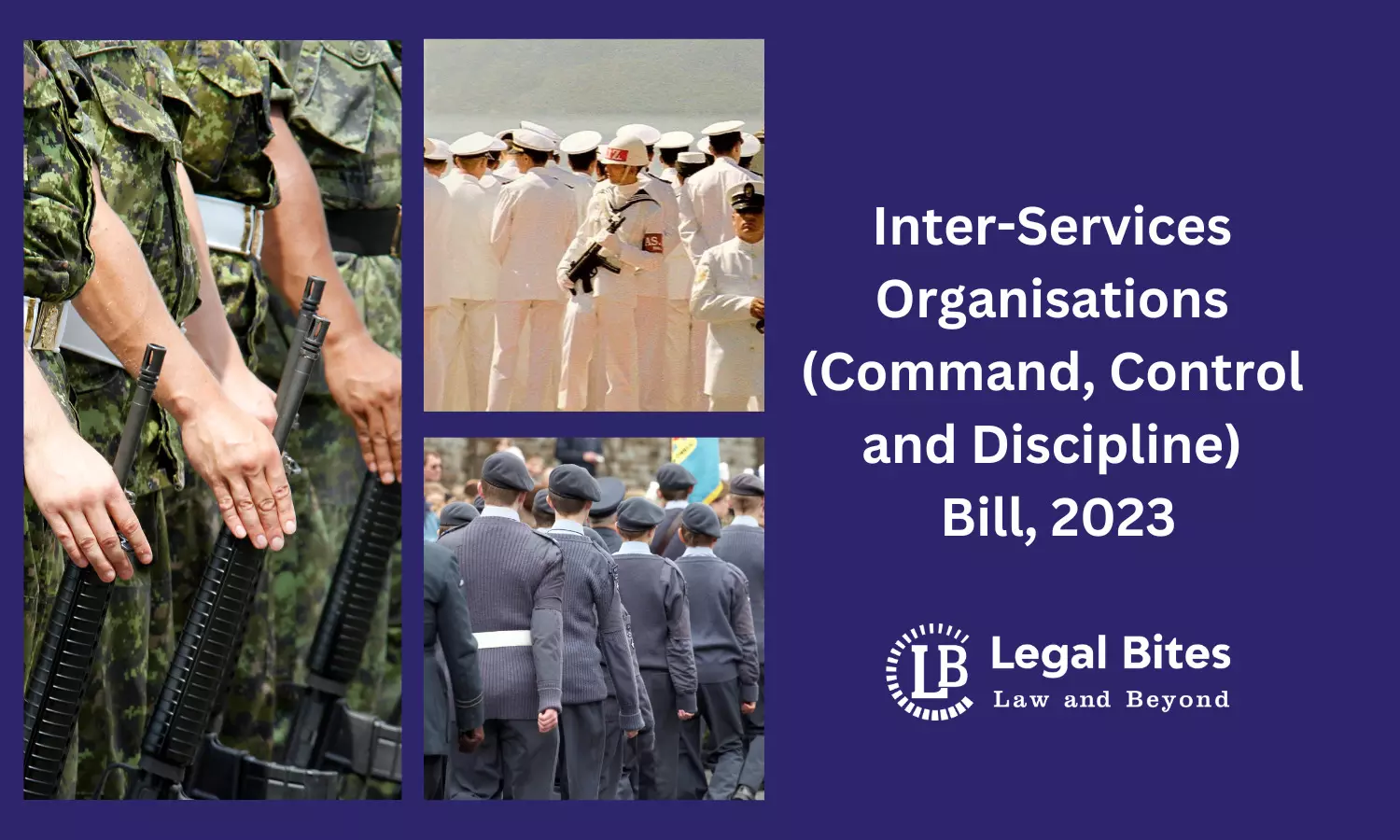Inter-Services Organisations (Command, Control and Discipline) Bill, 2023 | #Must Know
Here's all about the Inter-Services Organizations (Command, Control, and Discipline) Bill, 2023, introduced by the Central Government in the Lok Sabha.

Here's all about the Inter-Services Organizations (Command, Control, and Discipline) Bill, 2023, introduced by the Central Government in the Lok Sabha, seeks to enhance the power vested in the Tri-Services commanders
Introduction
The Inter-Services Organizations (Command, Control and Discipline) Bill, 2023 authorizes the Central Government to establish an Inter-Services organization. The Bill comprises mainly Inter-Services Organizations, encompassing the Andaman and Nicobar Command, the National Defence Academy & the Defence Space Agency. By the bill's provisions, the Central Government has the power to set up inter-services organizations controlled by an Officer-in-Command, encompassing personnel from at least 2 of the 3 services – Army, Navy, and Air Force.
The Inter-Services organization can also comprise a Joint Services Command, comprising units/ service personnel from the Army, Navy, and Air Force, controlled by a Commander-in-Chief or Officer-in-Command. The bill empowers the Officer-in-Command and Commander-in-Chief of Inter-services Organizations to have control over personnel, even if they are of different services. The service personnel of the Air Force, Army & Navy function under the Air Force Act, 1950, the Army Act,1950 and the Navy Act, 1957 respectively. According to these acts, officers from the particular services only, have the power to perform disciplinary control on the service personnel.
The Bill also suggests empowering the Inter-Services Organizations without altering the stated service acts. The said empowerment allows operative command, control and discipline on the personnel of all services underneath their command.
Need for the Bill
- In the absenteeism of the said bill, the prevailing protocol commands that personnel working in Inter-services organizations be sent back to their parent organisation for the commencement of disciplinary and administrative actions. This procedural requirement has noteworthy drawbacks, mainly contributing to prominent delays in the resolution course and suffering related financial costs due to the intricate movement of personnel.
- An extra multifaceted challenge arises from the requirement to initiate multiple proceedings governed under different service Acts, describing dealing with indistinguishable sets of facts & circumstances. This unwieldy requirement complicates the legal proceedings and also brings significant delays in the disposal of cases.
- It also adversely affects the well-known ethics of discipline of the Armed Forces.
- The government also contends that the said bill embraces the link to numerous essential improvements. Firstly, it is projected to ease the speedy disposal of cases by removing the necessity for personnel to be returned to their parent organizations. This, in turn, is anticipated to result in considerable time savings & abridged economic burdens on the public, as the bill proposes to limit the previously experienced costs related to the undertaking of personnel.
- Also, the bill is intended for greater incorporation and cooperative efforts among armed forces personnel. By managing disciplinary & administrative processes while eliminating unnecessary proceedings under other service acts, the government expects that the said legislation will improve joint manship in the Armed Forces, which will help establish a cohesive and effective operational environment.
Suggestions of the Standing Committee
The committee focuses on the unchanged way of the bill as a statute, highlighting its role as permitting legislation to authorize heads of Inter-services organizations for operative command and control without altering the respective acts. Service personnel within inter-services organizations will uphold authority under their corresponding service acts.
Factors Leading to Committee Approval of the Bill
The committee opined that the Bill will produce abundant tangible advantages, which will include-
- Guaranteeing that the heads of inter-services organizations shall keep proper discipline and effectiveness within their formations.
- Eradicating the exercise of sending back the personnel under disciplinary suit to their parent Service units.
- Easing the steadfastness of cases involving disorderliness.
- It results in cost and time savings for the government by evading the beginning of multiple proceedings.
Rationale Behind the Proposed Law
1. 3 Separate laws for three services- The Indian Armed Forces are governed under three distinct laws which are described for each service – The Air Force Act(1950), The Army Act(1950) and The Navy Act(1957). Within the ambit of these legal frameworks, disciplinary authority is limited to officers of the matching service. Accordingly, an Air Force officer does not possess legal authorization to punish a member of the Army/Navy and vice versa.
2. Restrictions of Disciplinary Powers- This current legal structure's limitations include commanders-in-chief of joint services commands & officers-in-command of inter-services organizations, as they lack disciplinary powers.
3. Time & Financial Costing- The existing system requires the return of personnel to their parent service for the instances of disciplinary or administrative actions, involving both time-consuming processes as well as financial costs.
4. Obstructions to Speedy Disposal of Cases- Besides, when disciplinary or administrative proceedings mandate the commencement of multiple proceedings under the corresponding Service Acts. This not only bargains the standards of discipline but also hinders the timely disposal of cases.
Features of Inter-Services Organisations (Command, Control and Discipline) Bill, 2023
Key features of the Bill encompass the following attributes:
Inter-services Organisation: The Bill proposes the constitution of Inter-services organizations such as the Andaman and Nicobar Command, the Defence Space Agency, and the National Defence Academy and the Central Government is authorised to form an Inter-services Organisation which shall consist of personnel from at least 2 out of the 3 services—Army, Navy, and Air force and these organizations can be put under the supervision of an Officer-in-Command and these organizations can also include a Joint Services Command, led by a Commander-in-Chief.
The Controlling Power of Inter-Services Organizations: The Commander-in-Chief or Officer-in-Command of Inter-services Organizations has not been given the authority to take disciplinary or administrative actions over personnel. The Bill proposes to delegate this authority to the Commander-in-Chief or Officer-in-Command, authorizing them to execute the command and have control over the personnel related to the organization. This comprises the obligation of upholding discipline and guaranteeing the proper discharge of duties by service personnel under their supervision.
The Central Government will have the supervising power of an Inter-Services Organisation. Moreover, the government is approved to give commands to these organizations which concern national security matters, general administration matters or public interest matters.
Other forces under Central Government: The Central Government possess the power to elect any force recognized and continued in India to which the Bill will be made applicable. This will extend far beyond the personnel of the Army, navy, and Air Force.
Commander-in-Chief: The following are the eligible officers who can be appointed as Commander-in-Chief or Officer-in-Command-
- General Officer of the regular Army (rank above Brigadier)
- a Flag Officer of the Navy who has the rank of Admiral of the Fleet, Admiral, Vice-Admiral, or Rear-Admiral, or
- an Air Officer of the Air Force who ranks above group captain.
He possesses the authority to exercise all disciplinary as well as administrative powers delegated to:
(i) General Officer commanding the army,
(ii) Flag Officer Commanding-in-Chief of a Naval Command,
(iii) Air Officer Commanding-in-Chief of an Air Command,
(iv) Any other officer/ authority postulated in the service Acts, &
(v) Any other officer/authority as notified by the government.
The Commanding Officer: The Bill sets up a Commanding Officer who is responsible for supervising a unit/ ship/ establishment. This officer is instructed by the Commander-in-Chief or Officer-in-Command of the said inter-services organisation and embraces the authority to start disciplinary or administrative actions against personnel associated with that association.
Advantages of the Move
- The Integrated Theatre Command- The formation of the Inter-Service Organisation is an important stage towards the making of an Integrated Theatre Command
- Enhanced Coordination- This Bill looks at the challenges faced due to modern warfare, considered by amplified dependence on technology and network-centric actions. The Inter-Service Organisation eases for better harmonization and synchronization within the military.
- Cost-Effectiveness Mechanism- Joining of services outcomes in the accelerated disposal of cases which leads to the reduction in related financial costs. This cost-effectiveness mechanism is a notable benefit of the projected Inter-Service Organisation.
- Simplifying the Proceedings- The formation of the Inter-Service Organisation streamlines the complicated multiple proceedings. It rationalizes disciplinary actions taken against personnel by enabling the process more well-organized and forthright.
Conclusion
Currently, the Indian armed forces comprise 17 commands, which include 7 commands from both the Army and Air Force and three commands from the Navy where each command is controlled by a military officer of four-star rank.
One of the prominent growths in recent years has been the formation of Joint Commands in India’s armed forces. The Andaman and Nicobar command Acts as the initial Tri-Service theatre command in the Indian Armed Forces which is situated in Port Blair under the ambit of the Andaman and Nicobar Islands.
The Andaman and Nicobar command ensures the island's security. It provides security in the Bay of Bengal as well as the eastern part of the Indian Ocean. Moreover, the Strategic Forces Command also known as SFC, is a tri-service command which is accountable for handling the delivery and operational working of the country’s nuclear assets.
However, due to different Acts that govern soldiers from different services such as the Navy Act(1957), Air Force Act(1950) and Army Act(1950), a lot of challenges keep on persisting in uniting the armed forces. The current joint services setup requires a return to their parent units in case of disciplinary proceedings. This deficiency of administrative authority poses an obstacle. Forming joint commands is vital to creating integrated war-fighting abilities within budget limitations. Moreover, tri-service organizations such as Defence Intelligence Agency, Defence Space Agency and Defence Cyber Agency, play a key role in helping Indian armed forces operations.


